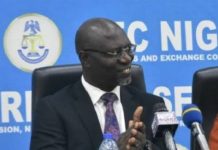The Economic and Financial Crimes Commission (EFCC) disclosed on Tuesday that some foreign missions in Nigeria have been engaging third parties for transactions in foreign currencies, a practice deemed illegal under Nigerian law.
During an interview on The Morning Show on Arise Television, EFCC spokesperson Wilson Uwujaren revealed the agency’s findings. He stated that several foreign missions had outsourced consular services to third parties who invoiced in dollars, sometimes determining the exchange rate of the naira during transactions with Nigerians and foreign nationals in Nigeria.
Concerned by this practice, the EFCC sent an advisory letter to the Minister of Foreign Affairs, Yusuf Tuggar, titled “EFCC Advisory to Foreign Missions against Invoicing in US Dollars,” on May 11, 2024. The advisory cautioned against transacting in foreign currencies and mandated the use of the naira.
Clarifying the EFCC’s stance, Uwujaren emphasized that the agency did not have the authority to ban or dictate financial practices to foreign missions. However, it was illegal for foreign missions to conduct transactions in foreign currencies within Nigeria, prompting the commission’s advisory on adhering to the naira.
Uwujaren specified that the EFCC communicated with the Ministry of Foreign Affairs, which is responsible for liaising with foreign missions. The commission’s advisory aimed to highlight the conflict between the practice and Section 20, Subsection 1 of the Central Bank of Nigeria Act, which designates the naira as the sole legal tender in Nigeria.
Regarding the Ministry of Foreign Affairs’ response to the advisory, Uwujaren explained that the ministry had established protocols for engaging with foreign missions and would handle communication accordingly.
To prevent the abuse of the naira and deter illegal forex practices, the EFCC has implemented enforcement measures, including establishing a special task force on naira abuse and forex malpractices across Nigeria. Uwujaren urged Nigerians to report instances of businesses or individuals charging in dollars instead of the naira, reaffirming the EFCC’s commitment to upholding legal financial practices within the country.













